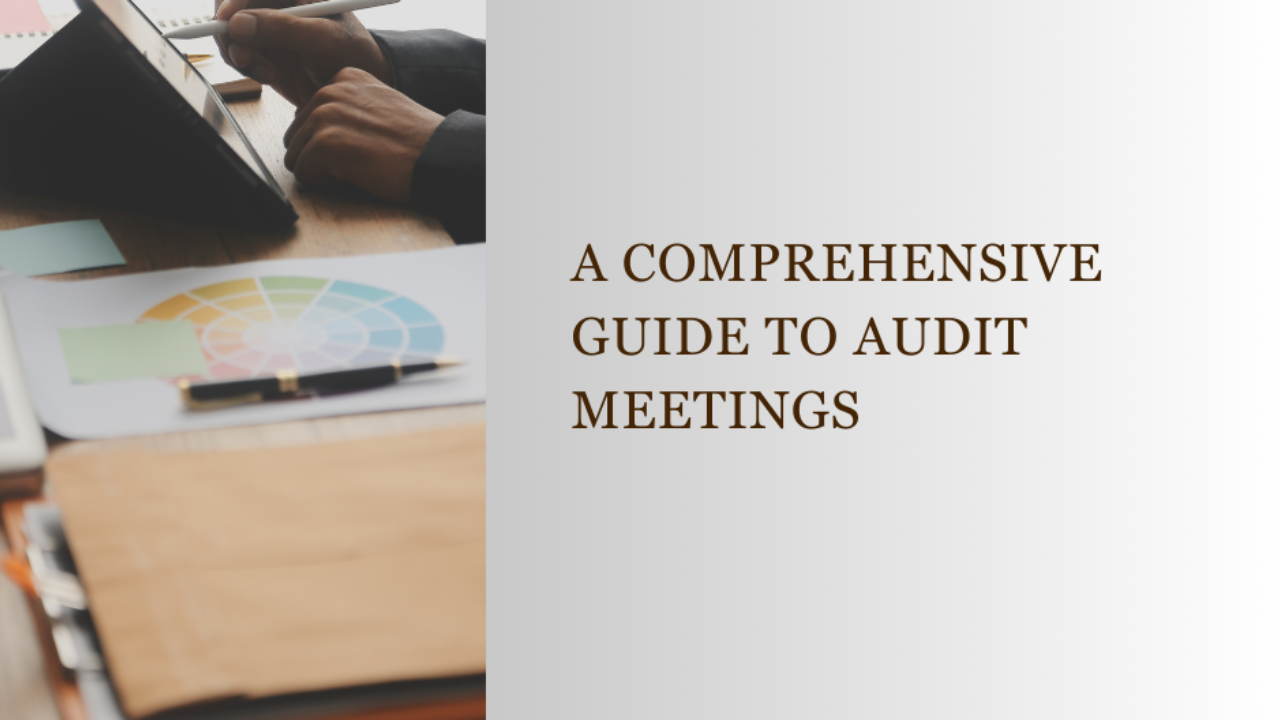A comprehensive guide to audit meetings
Sep 21, 2025
One key aspect of the audit process that significantly influences its success is the series of meetings held at various stages.
From the initial pre-audit meeting to the final exit meeting, these gatherings serve as critical checkpoints for communication, collaboration, and alignment between auditors and auditees.
In this comprehensive guide, we will review the different types of audit meetings and explore their purposes, agendas, and potential questions to ask.
Whether you're a seasoned auditee or facing an audit for the first time, understanding the nuances of each meeting can help you effectively prepare, participate, and derive maximum value from the audit process.
1. Pre-Audit Meeting
The pre-audit meeting serves as an opportunity for auditors to gather preliminary information and establish rapport with the organization. It typically occurs when auditors are auditing an entity for the first time or when significant changes in the organization's operations may impact the traditional audit approach.
The primary goal is to gain insights into the organization's structure, processes, and objectives and to introduce key members from both teams
Potential Pre-Audit Meeting Agenda Items:
-
Introductions
-
Organization Overview: Provide auditors with an understanding of the organization's structure, operations, and any recent changes.
-
Audit Expectations: Discuss the purpose of the audit and any specific areas of focus.
-
Questions to consider
-
What specific areas will the audit cover?
-
Who is the intended audience for the audit report
2. The Entrance Meeting
The entrance meeting marks the official start of the audit. It provides an opportunity for auditors to communicate their approach and for auditees to ask any initial questions.
Potential Entrance Meeting Agenda Items:
-
Introduction of auditor and auditee teams
-
Audit Scope and Objectives: Reiterate the audit objective; operational areas in scope; audit period to be tested.
-
Audit Methodology: Discuss the approach and techniques that will be used during the audit.
-
Initial information request, and protocols for sharing information
-
Roles and Responsibilities: Clarify the roles of auditors and auditees during the audit process.
-
Schedule and Logistics: Confirm dates, times, and locations for audit activities.
-
Questions to consider
-
How will you handle sensitive information / what are the protocols for sharing information securely?
-
What can we expect in terms of disruptions to our daily operations / estimate of time commitment?
-
Main points of contact
3. The Walkthrough Meeting
A walkthrough meeting is an interactive session conducted by auditors to gain a comprehensive understanding of the processes, controls, and procedures within the audited area.
It typically involves auditors observing and documenting the flow of transactions or activities, identifying key control points, and assessing their effectiveness.
The purpose of the walkthrough is to validate the accuracy of process documentation, identify potential control gaps or weaknesses, and gather evidence to support the audit objectives.
Potential Audit Walkthrough Meeting Agenda Items:
-
Introduction to Walkthrough Process: Provide an overview of the walkthrough objectives and methodology.
-
Process Overview: Briefly outline the key processes and activities to be evaluated.
-
Walkthrough Demonstration: Conduct a step-by-step walkthrough of selected processes, with auditors observing and asking questions as needed.
-
Documentation Review: Validate the accuracy and completeness of process documentation, including flowcharts, narratives, and procedure manuals.
-
Questions to consider:
-
What criteria are you using to evaluate the effectiveness of our controls?
-
Are there any immediate concerns or observations you've identified during the walkthrough?
4. Check-in/Status Meeting
Check-in or status meetings occur periodically during the audit to review progress, address any issues, and ensure alignment between auditors and auditees.
Potential Audit Check-in/Status Meeting Agenda Items:
-
Progress Update: Discuss what has been accomplished and any challenges encountered.
-
Issue Resolution: Address any issues, clarify any concerns that have arisen during the audit or discuss feedback on the audit process.
-
Audit findings: Review and validate preliminary audit findings
-
Outstanding information: Review the audit request list and determine next steps around pending / overdue items
-
Next Steps: Outline the tasks and activities planned for the next phase of the audit.
-
Questions to consider
-
Are there any areas where we need to focus more attention?
-
How are we tracking against the audit timeline?
5. The Exit Meeting
The exit meeting marks the conclusion of the audit and provides an opportunity for auditors to present their findings and recommendations to the auditees.
Potential Exit Meeting Agenda Items:
-
Presentation of Findings: Summarize the audit findings, including any observations or areas of concern.
-
Recommendations: Offer suggestions for improvements or corrective actions based on the audit results.
-
Q&A Session: Allow auditees to ask questions or seek clarification on the findings and recommendations.
-
Next Steps: Discuss the audit report, follow-up process and any additional actions required.
-
Questions to consider
-
What are the implications of these findings for our organization?
-
How soon do you expect us to implement the recommended actions?
Overall, audit meetings play a crucial role in ensuring effective communication, collaboration, and transparency between auditors and auditees throughout the audit process.
Clear agendas, open dialogue, and mutual understanding of roles and expectations are essential for successful audit outcomes.